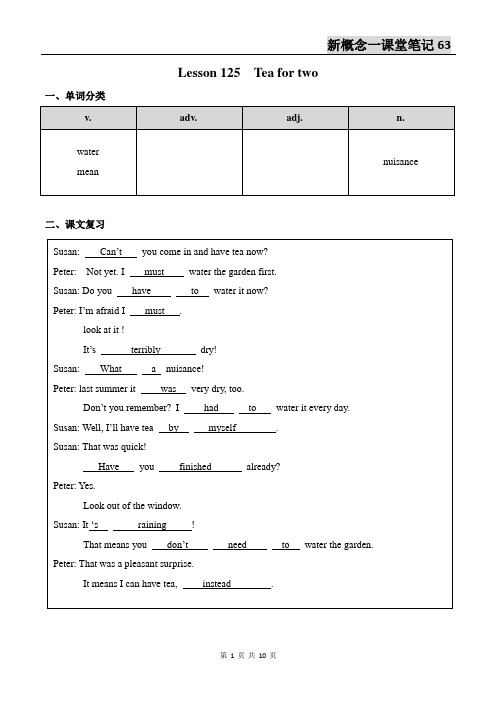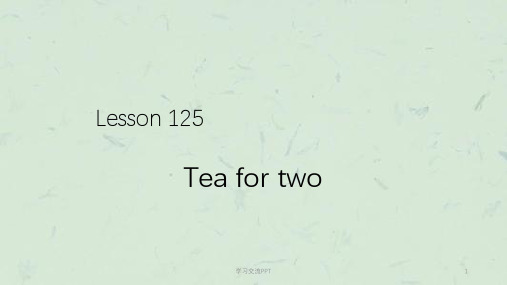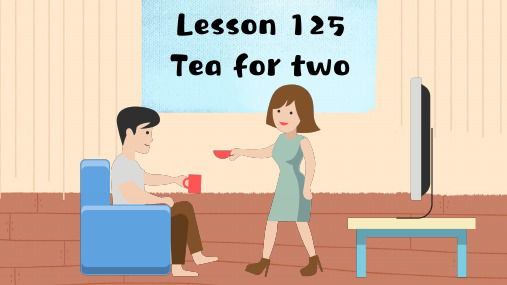新概念英语第一册第125-126课:Tea for two
新概念英语-第一册-第125-126课PPT课件

eg:I’m surprised at her answer.我对她的回答感到惊讶
.
9
immediately adv. 立即地,紧接地
eg:If you hear alarm,leave the building immediantely.要是听见警报,马上离开大楼.
eg:June comes immediately after May.
make a nuisance of oneself = make oneself a nuisance 惹人讨厌
eg: Don’t make yourself a nuisance to others. 不要做一个令人讨厌的人。
.
7
mean (meant ; meant) v.意味着,意 思是
What does the word mean? 这个单词是什么意思?
淋浴房 http://www.linyufang.so/ 整体淋浴房 0 圬罔牁
Homework
1.预习lesson125课文 2.单词5+ 3.课后习题作业
.
13
5.To my s________, she is a teacher. 二.Changing words.
1.It's_________(terrible) dry.
st summer it ______(be) wet.
3.I'll have tea by ______(I).
4.Have you ________ (finish) already?
.
2
waste water
sweet water water quality
hot water
新概念英语第一册Lesson125-126笔记(语法点+配套练习+答案)

I'mterriblysorry.我非常抱歉。
I’ve got aterribletoothache.我得了要命的牙疼。
dry
1.adj.干燥的
反义词:wet
2.v.使...变干
It is alwaysdryinfall.秋天天气干燥。
2. ____ bright girlsthey are!
A. WhatB. What a C. How D. How a
3. ____ interestingthe film is!
A. What B. What anC. HowD. How a
4. ____ sunny day! Let’s go out for a walk.
这个单词是什么意思?
The red lightmeans stop.红灯意味着停止。
Imean to traveltomorrow.
我打算明天去旅行。
surprise 1. n.意外的事,吃惊
to one’s surprise令某人吃惊的是
2.v.令人吃惊
surprising adj.令人吃惊的(物)
surprised adj.感到吃惊的(人)
be surprised at sth.对…感到惊讶
To my surprise, she is the mother of two children.
令我惊讶的是,她竟然是两个孩子的妈妈。
Youalways surpriseme.你经常让我惊喜。
This is such asurprisingthing.
我爷爷正在花园里浇花。
一杯水a glass of water
新概念一第125-126课精品课件

What a nuisance!
01
02
这是对Peter所说的“It’s terribly dry”这句话的评价
6. Last summer it was very dry, too. Don’t you remember? I had to water it every day. ① last summer / week / year this spring / week next year / month ② had to 是have to 的过去式,说明过去不得不做的事情 我昨天早晨必须早起来赶班车。 I had to get up early yesterday morning to catch the bus. ③Don’t you remember? 否定疑问句
Key words&expressions
1. water ⑵ n. 水;海水;雨水;海域,大片的水 Give me a glass of water. 用船运by water = by ship =by sea 邮递员用船运送包裹。 Postmen send the packages by water. 花钱如流水 spend money like water 我的姐姐总是花钱如流水。 My sister spends her money like water.
Key words&expressions
5.mean (meant ; meant) ⑴v. 意思是 What do you mean by saying that? 你那么说是什么意思? 这个单词什么意思? What does the word mean? = What’s the __________ of the word? 红灯意味着“停车”。 The red light means “stop”.
新概念英语第一册第125-126课-Tea for two

新概念英语第一册第125-126课:Tea for twoLesson 126 Have to and do not need to不得不和不必要New words and expressions生词和短语immediatelyadv.马上地Lesson 125-126 自学导读First things first课文详注Further notes on the text1.Cant you come in and have tea now, Peter?彼得,你现在能进来喝茶吗?这是否定疑问句,表示邀请。
请参见第77-78课_Terrible toothache语法部分。
2.Dont you remember?你不记得了吗?这也是否定疑问句。
3.dont need to= neednt。
表示“不必”,是must和have to的一般现在时否定式。
4. a pleasant surprise,意想不到的好事,令人惊喜的事。
语法Grammar in usemust, have to和neednt这3个词都表示必要性。
在前面已对must和have to介绍过。
must是情态助动词,而have to是一般动词,二者在确定句中一般可以互换,表示不行躲避的义务或责任。
must更带有说话人的主观颜色,而have to则更强调客观要求和外界影响。
must一般只能表达现在的必要性,而have to则可以表达过去或将来的必要性。
对比例句:Must you go now?你必需现在就走吗?Yes,I have to leave at once.是的,我不得不立刻就走。
Yes,1 must leave at once.是的,我必需立刻就走。
I shall have to leave London tomorrow.我明早得离开伦敦。
I had to stop smoking because it was forbidden in my company.由于我所在的公司内禁止抽烟,所以我不得不停止了吸烟。
新概念英语第一册125-126课课件

• 你不跟我来么?不,我要跟你去的。
• --Won’t you come with me?
• --Yes, I will.
• water 用作动词,在构词法上属于转化,即词由一个
词性转为另一个词性,词义随之变化。
学习交流PPT
9
• Do you have to water it now? • have to 必须,不得不 • 否定式,疑问式的构成要借助助动词do. • 我必须等他吗?不,不必。 • Do I have to wait for him? • No, you don’t have to. • must 则不需要再借助助动词 • 我必须现在就见他吗? • Must I see him now? • Yes, you must. • No, you needn’t .
• to one’s surprise
• 让我惊讶的是,她已经是两个孩子的妈妈了。
• To my surprise, she was the mother of two children.
• 2)v. 使…惊讶,使…吃惊
• 你总是让我吃惊。
• You always surprise me.
• surprised adj. 吃惊的,感到惊讶的
学习交流PPT
11
• What a nuisance!
• 是对Peter所说的“It’s terribly dry”这句话的评价。
• Last summer it was very dry, too. Don’t you remember? I had to water it every day.源自学习交流PPT10
• I’m afraid I must. Look at it! It’s terribly dry. • I’m afraid 后面可以跟从句作宾语。 • 这事恐怕我做不了。 • I’m afraid I can’t to do this. • 恐怕我又不能及格。 • I’m afraid I’ll fail again. • 恐怕他今天不能回来。 • I’m afraid he can’t be back today.
Lesson125126Teafortwo(课件)新概念英语第一册

Tea for two SUSAN: Can’t you ____ _in_ and _h_av_e_ _te_a_ now, Peter? PETER: _N_o_t _y_e_t . I must _w_at_e_r _t_h_e_ _g_a_rd_e_n_ first.
surprise [sE5praIz]
n. 惊奇,意外的事
That was a pleasant surprise.
Q1. What must Peter do first? Q2. Was it terribly dry last summer? Q3. What’s the pleasant surprise?
A. had to
B. have had to C. will have to
3. I _d_o_n_’t__ne_e_d__t_o_ go to the dentist’s very often.
A. didn’t have to B. don’t need to C. doesn’t have to
SUSAN: It’s raining! _T_h_a_t_ _m_e_a_n_s you don’t need to water
the garden. PETER: That was _a_ _p_le_a_s_a_nt_ _s_u_rp_r_i_se_.
_I_t _m_e_a_ns_ I can have tea, _in_s_te_a_d_.
Lesson 125 Tea for two
It’s always terribly dry in the north of China, because it hasn’t rained or snowed for a long time. In Beijing, the workers have to water the grass and trees everyday. During the last Spring Festival we had a big surprise. It snowed twice in Beijing. The workers there had a good rest. Thank God.
新概念课件L125-126

Listen second time
Repeat and answer some questions.
Listen and retell
Who Susan Peter What Have tea Water the garden A pleasant surprise Why —————— Dry rain
Tea for two
Peter
Susan
water
water watered waters water is
2. terribly adv. = very 它是非常重的。 It's very heavy. = It's terribly heavy. ---- terrible adj. 它是糟糕的。 It's terrible. 多么糟糕的一天! What a terrible day it is! How terrible the day is!
Correction Summary
Correct the quiz paper and the dictation paper.
have to 有人称或时态的变化 must 无人称或时态变化
have to - negative sentence - question sent They have to go now. --NS: They don't have to go now. --QS: Do they have to go now? Yes, they do. No, they don't.
must - negative sentence must needn't - question sentence must提前
新概念英语一册NCE1L125-126

surprise 吃惊
• • • • • • • 例句 I got a big surprise. 我大吃一惊。 To my surprise, … adj. surprised 吃惊的 a surprised look 吃惊的表情 be surprised at sth. 因……感到惊讶
Let’s watch the video and answer questions: Does Susan have tea by herself?
2. have to 不得不,一定 (客观上觉得必须) I have to study hard. (我不得不好好学习。也许是父母 要求的)
• 3. need "需要",表示有这个需要和必要去做某事。 • need做情态动 • • • • • • • • -Must I arrive on time? -Yes, you must. - No, you needn't. -Do I have to arrive on time? -Yes, you have to. - No, you don't have to.
1. SUSAN: Can't you come in and have tea now, Peter? 2. PETER: Not yet. I must water the garden first. 3. SUSAN: Do you have to water it now? 4. PETER: I'm afraid I must. Look at it! It's terribly dry. Key points: 1.否定疑问句 2. e.g. Has your father come back from England? Not yet. = He hasn’t come back yet. yet 用在否定句中表“还”,用在疑问句中表“已经” 3. must & have to 4. I’m afraid + 宾语从句 I’m afraid I must water it now.
新概念英语第一册Lesson125126Teafortwo小学英语初中英语全国通用

做个小练习 巩固一下吧~
— I must telephone him. What about you? — I ________ him, too.
A. has to telephone C. have to telephone
B. have to telephoning D. had to telephoning
上一题
下一题
— I must travel by ship. What about Tom and Jenny? — Tom and Jenny ________ by ship, too.
A. have to travel C. have to traveling
B. has to travel D. had to traveling
Language Point
语句讲解、课文讲解
2. Well, I'll have tea by myself.
新概念英语第一册第125126课

Homework
1.预习lesson125课文 2.单词5+ 3.课后习题作业
Lesson 125-126
Tea for two
water (1) vt. 供以水;给…浇水
eg: My grandpa is watering the flowers in the garden.
我的爷爷正在花园里面浇花。
⑵ n. 水;海水;雨水;海域,大片的水 eg:Give me a glass of water. 给我一杯水 by water 船运= by ship =by sea
eg: To my surprise, she is the mother of two children. 另我惊讶的是,她竟然是两个孩子的妈
(2)surprising adj 惊讶的,惊奇的(物)
eg:It’s really a surprising news.这真是一个惊奇的消息。
(3) surprised adj 另人惊讶的 (人) be surprised at + n / doing sth 对…感到惊讶
⑵ v. 把...弄干 She dried his hair with a towel.
她用毛巾把头发弄干。 dry one’s eyes 擦干眼泪
nuisance n. 讨厌的东西或人
eg:What a nuisance! 真是太讨厌了 eg:You are a real nuisance to me.你真是太讨厌了
(1)mean to do sth 打算做... eg:I mean to go tomorrow.
我打算明天走。 (2) mean doing 意味着 The picture means stopping.
新概念英语1_Lesson125-126

125 Tea for two1 Key words:① water 注意a的发音n. 水hot water 热水waste water 废水sweet water 饮用水by water = by shipv. 浇水water the flowermake one’s mouth water 令人流口水The delicious dishes made my mouth water② terriblyadv. 非常地,极度地It’s terribly cold this winter.I feel terribly ill today.Adj. terrible 糟糕的,极差的She is a terrible student. / How are you? —Terrible③dryadj. 干燥的反义词wet dry air 干燥的空气v. 把……弄干dry one’s eyes/tears 擦干眼泪Dry your hands on the towel.n. hair dryer 吹风机④ nuisance n. 讨厌的东西或人What a nuisance! 真讨厌!make a nuisance of oneself = make oneself a nuisance 惹人讨厌⑤ mean 意味着,意思是v. 意味着,意思是What do you mean by saying that? 你那么说是什么意思?mean to do sth. 打算做某事I didn’t mean to hurt you.mean doing sth. 意味着做某事The picture means stopping.adj. 吝啬的,卑鄙的He is mean about money.⑥ surprisen. 惊奇,意外的事情 a big surprise 大惊喜,大吃一惊to one’s surprise = to the surprise of sb令人惊讶的是,in surprise 吃惊地Everyone looked at him in surprise.v. 使…惊奇The news really surprised me. / You always surprise me.adv. surprised I’m so surprised to see him on the street.2 TextCan’t you come in and have tea now, Peter?①否定疑问句可以表示说话者惊讶、责难的口吻或赞扬,也可以表示说话者某种建议、邀请、请求或者看法Can’t you wait a moment? / Can’t you come and help me?Isn’t it hot here? / Don’t you want to stay with us?回答,用Yes, I can. / No, I can’t. 分别译为:不,我能。
新概念英语第一册125-126课课件

He dried his hair with a towel. 他用毛巾把头发擦干。
• 3) vi.变干 • Leave the dishes to dry. • 让碟子变干。
• The paint will dry in two days.
terribly ['terəbli] adv. 非常;可怕地;极度地
I was a terrible fool, you know. 你知道, 我那时是个十足的傻瓜。 My son has suffered ['sʌfə] terribly. He
has lo打击, 失去了最好
• 油漆两天会变干。
• Phrase • dry cleaning n.干洗 • dry weight 干重 • dry land 旱地 • dry skin 干性皮肤
Nuisance ['nju:səns] n.讨厌的人;损害;麻烦事;讨厌
的东西
public nuisance n.妨害公众安宁; 妨害公众利益的人或事物
• You mustn't turn left. • 你不能左转弯。(表示绝对禁止)
情态动词的用法
定义: 情态动词是一种本身有一定的词义,但 要与动词原形及其被动语态一起使用,给 谓语动词增添情态色彩,表示说话人对有 关行为或事物的态度和看法,认为其可能 、应该或必要等。情态动词后面加动词原 形。
• It is cold in the room. They must have turned off the heating.
• 屋里很冷,他们肯定把暖气关了。
• 2. 否定句中用can’t / couldn’t(不可能), may not/might not(可能不)。
新概念英语成人版第一册:L125-126 课件

进来 不得不做某事 喝茶 自己一个人 给花园浇水 向窗外看 真讨厌! 不需要做某事
Grammar
must, have to 和 needn't
1) must是情态动词,have to是复合动词 2) must没有时态、人称变化
have to有时态、人称变化 一般现在时: don't/doesn't have to 一般将来时: will (not) have to 一般过去时: didn't have to / had to 现在完成时: have/has (not) had to 3)have to是客观需要,译为“不得不做某事”;
4. ____ hard work it is!
A. How
B. What C. What a
D. How a D. How a
D. How a D. What an
come in have to do sth. have tea by oneself water the garden look out of the window What a nuisance! don't need to do sth.
(物)
surprised adj. 感到吃惊的
(人)
You always surprise me. This is such a surprising thing. I am really surprised. The teacher is surprised at her answer.
water terribly dry mean nuisance surprise
3.模仿例句改写提问 I must go now. Do you really have to go now? 1. I must telephone him. 2. Mary must wait for him. 3. Jim must meet her. 4. Tom and Mary must travel by ship.
新概念英语NCE1_lesson125-126-2课件

★I’m not more than
twenty-nine myself.
• not more than是不超过”、“不到”的 意思。
表示猜测和推断的情态助动词 must和can’t
•
①表示有客观事实作为依据的推测和判断的
最常用形式是must和can’t。它们一般与系动词be
连用。原句是主系表结构。肯定的推断用must be
suggestions. • 至少你应该考虑一下我们的建议。 • ② 反正;无论如何;不管怎样 • That party wasn’t exciting at all, but at
least it filled the time. • 那个聚会一点儿都不令人兴奋,但不
管怎样,它使人打发了那段时光。
Lesson 125 Tea for two
★water v. 浇水
• ① v. 浇(洒)水;供水;喂水 • The garden is very dry, I’m going to water
it tomorrow morning. • Tim is watering his lovely little dog. • ② v. 充满水;充满泪水;流口水 • He felt sad and his eyes watered a little. • 他感到难过,眼睛有点儿湿润了。 • Ice cream always makes his mouth water. • 冰淇淋总能让他馋得淌口水。
• meaning n. 意思,意义
• What’s your meaning? 你是什么意思? • What’s the meaning of sth? 意思是---
情态动词
• must/needn’t • can/cannot • may • would • could • had better
新概念1第125-126课

★water
vt. 供以水;给…浇水 My grandpa is watering the flowers in the garden.
n. 水;海水;雨水;海域,大片的水 Give me a glass of water. by water = by ship =by sea 用船运 Postmen send the packages by water. spend money like water My sister spends her money like water.
I must work hard. 我必须努力工作。(我觉得有必要这么做。) I had to go home by ship last night.我昨晚不得不乘船回家。 (有可能没有赶上其他的航班或者火车,没选择才坐船。)
can与could
could与can都是情态动词,could是can的过去式。二者都可用于表示请求, 但是用法稍有不 同。
这个杯子能保持糖的干燥。
他用毛巾擦干头发。 擦干眼泪
冬天衣服不容易干。
★nuisance
n. 讨厌的东西或人 What a nuisance! 真讨厌! You are a real nuisance to me.
你真是太讨厌了!
make a nuisance of oneself = make oneself a nuisance 惹人讨厌
否定疑问句的回答不受否定形式的影响,回答时只根据事实,是事实就用yes, 不是事实则为No.但 在翻译时要注意yes和no的译法。
--Won't you come with me? 你不跟我来么? --Yes, I will. 不,我要跟你去的。
新概念英语第一册Lesson+125-126+课件

1. Does Susan have tea by herself?
Have you finished already?
Peter: Yes. Look out of the window.
Susan: It's raining! That means you don't need to water the garden.
Have you finished already?
Peter: Yes. Look out of the window.
Susan: It's raining! That means you don't need to water the garden.
Peter: That was a pleasant surprise .
1. Peter must water the garden first. T 2. Peter had to water the garden every wdeaeyk. F 3. Peter doesn't need to water the garden. T 4. Peter ccaann’t have tea at last. F
Yes,主语+do/does. No, 主语+don’t/doesn’t.
I have to water it at once.
__I___ _d_o_n_’_t _h_a_v_e_ __t_o__ water it at once.(改为否定句) _D__o__ _y_o_u__ h__a_v_e_ __to___ water it at once?(改为一般疑问句) W__h__a_t __d_o__ _y__o_u_ _h_a_v_e_ __t_o__ __d_o__ at once?(对划线部分提问)
新概念一lesson125-126课件(推荐)

surprise
in
n.惊奇,意外的事
surprise 惊讶地; 惊奇地 to one’s surprise 使 某人感到惊讶的是 be surprised at sth. 对……感到惊讶
surprising story I’ m surprised at…
surprised surprising They are__________ (surprise) at ______ (surprise) news.
3)---Don’t forget to come to my birthday party tomorrow. --- ___. A. I don’t B. I won’t C. I can’t D. I haven’t 答案B. will既可当作情态动词,表 请求、建议; 也可作为实义动词表 “意愿、意志、决心”,本题表示决 心,选B。
You mustn’t tell him about it.
你一定不要把这件事告诉他。
在否定结构中:don’t have to 表示 “不必”, mustn’t 表示“禁止”。
小结have to和must
两词都是 “必须”的意思, have to 表
示客观的需要, must 表示说话人主
观上的看法, 既主观上的必要。
Unit 63
5
6
1
2
3
4
water the grass
water
dryer(drier)
n. 烘干机;
吹风机
wet
dry
to do 打算、想 mean doing 意味着
mean
It means I can have tea.
新概念一L125-126Tea for two课件

①表示希望得到一个肯定回答 ②表示惊讶
LOGO
Look out of the window.
LOGO
That was a pleasant surprise.
• pleasant adj.令人愉快的 pleasantly adv.愉快地
LOGO
找出剩余文中的特殊句型
Look at it!
• 祈使句+感叹句
• ①Let 开头
②v原开头
③Be+adj.
• look at 看着
look for 寻找
look like 看起来像 look after 照顾
look up 查阅
look down 向下看
look out 小心
look out of 看..的外面 LOGO
②情态v *用于一疑时 Need I ...? -Yes, you need./-No, you needn't.
LOGO
It means I can have tea,instead.
• mean 引导的宾语从句 • instead 放句末,用‘,’隔开
LOGO
Do you have to water it now?
=be afraid of doing sth.害怕做某事
LOGO
That means you don't need to water the garden.
• mean 引导的宾语从句 • need ‘需要’
①实义v need to do sth 需要做某事 need doing sth 需要被做某事
LOGO
- 1、下载文档前请自行甄别文档内容的完整性,平台不提供额外的编辑、内容补充、找答案等附加服务。
- 2、"仅部分预览"的文档,不可在线预览部分如存在完整性等问题,可反馈申请退款(可完整预览的文档不适用该条件!)。
- 3、如文档侵犯您的权益,请联系客服反馈,我们会尽快为您处理(人工客服工作时间:9:00-18:30)。
Lesson 125 Tea for two两个人一起喝茶
Listen to the tape then answer this question.Does Susan have tea by herself?
听录音,然后回答问题。
苏珊是一个人喝茶吗?Susan: Can’t you come in and have tea now, Peter?
苏珊:彼得,你现在能进来喝茶吗?
Peter: Not yet, dear. I must water the garden first.
彼得:还不能。
我得先给花园浇水。
Susan: Do you have to water it now?
苏珊:你一定得现在浇吗?
Peter: I’m afraid I must. Look at it! It’s terribly dry.
彼得:恐怕我得现在浇。
你看看,干得厉害。
Susan: What a nuisance!
苏珊:真讨厌!
Peter: Last summer it was very dry, too. Don’t you remember? I had to water it every day.
彼得:去年夏天也是干得很。
你记得了吗?我不得不每天浇水。
Susan: Well, I’ll have tea by myself.
苏珊:好吧,我一个喝茶了。
Susan: That was quick! Have you finished already?
苏珊:好快啊!你已经浇完了?
Peter: Yes, dear. Look out of the window.
彼得:是的。
你看看窗外。
Susan: Good heaven! It’s raining. That means you needn’t water the garden.
苏珊:下雨了,这就是就是说,你不必给花园浇水了。
Peter: That was a pleasant surprise. It means I can have tea, instead.
彼得:这是意想不到的好事。
这意味着我反倒可以喝茶了。
New words and Expressions生词和短语
water
v. 浇水
terribly
adv. 非常
dry
adj. 干燥的,干的
nuisance
n. 讨厌的东西或人
mean (meant, meant)
v. 意味着,意思是
surprise
n. 惊奇,意外的事
Notes on the text课文注释
1 have to(过去式had to ),不得不,必须。
have to强调客观需要多一些。
must则着重说明主观看法。
2 What a nuisance!真讨厌!
3 by myself 我自己/独自。
同样,我们可以说by yourself, by himself, by herself, by itself, by ourselves,by yourselves, by themselves, by oneself。
Lesson 126 Have to and do not need to不得不和不必要
New words and expressions生词和短语
immediately
adv.立即地
Lesson 125-126 自学导读 First things first
课文详注Further notes on the text1.Can't you come in and have tea now, Peter?彼得,你现在能进来喝茶吗?
这是否定疑问句,表示邀请。
请参见第77-78课_Terrible toothache语法部分。
2.Don't you remember?你不记得了吗?
这也是否定疑问句。
3.don't need to= needn't。
表示“不必”,是must和have to的一般现在时否定式。
4.a pleasant surprise,意想不到的好事,令人惊喜的事。
语法Grammar in use
must, have to和needn't
这3个词都表示必要性。
在前面已对must和have to介绍过。
must是情态助动词,而have to是普通动词,二者在肯定句中一般可以互换,表示不可逃避的义务或责任。
must更带有说话人的主观色彩,而have to 则更强调客观要求和外界影响。
must一般只能表达现在的必要性,而have to则可以表达过去或将来的必要性。
对比例句:
Must you go now?
你必须现在就走吗?
Yes,I have to leave at once.
是的,我不得不马上就走。
Yes,1 must leave at once.
是的,我必须马上就走。
I shall have to leave London tomorrow.
我明早得离开伦敦。
I had to stop smoking because it was forbidden in my company.
因为我所在的公司内禁止抽烟,所以我不得不停止了吸烟。
如果我们用must来提问,则只能用needn't来表达否定的回答。
needn't 还可以理解为have to的否定回答。
needn't (don't need to)和don't have to 都表示不必要;而mustn't却表示绝对禁止,在说话人看来根本没有选择余地。
请看例句:
Must she leave early?
她必须早走吗?
She needn’t leave early.
她不必早走。
Do you have to take a taxi?
你必须乘出租汽车吗?
I don’t have to/need to take a taxi.
我不必乘出租车。
You mustn't turn left.
你不能左转弯。
(表示绝对禁止)
词汇学习Word study
1.mean v.
(1)意味着,即:
It's raining! That means you don't need to water the garden. 下雨了!这就是说,你不必给花园浇水了。
(2)(词语)表示……意思:
What does‘perfume’mean in English?
“perfume”一词在英语中是什么意思?
The green light means‘Go on.’
绿灯的意思是“继续向前”。
(3)意指;意欲:
What I mean is that we'll have to go back and look for it.
我的意思是:我们必须回去寻找它。
He didn't mean to hurt you.
他的本意并不是想伤害你。
2.water v.
(1)浇(洒)水;供水;喂水:
The garden is very dry, I'm going to water it tomorrow morning. 花园里很干了,明早我准备给它浇些水。
Tim is watering his lovely little dog.
蒂姆正在给他那只可爱的小狗喂水。
(2)充满水;充满泪水;流口水:
He felt sad and his eyes watered a little.
他感到难过,眼睛有点儿湿润了。
Ice cream always makes his mouth water.
冰淇淋总能让他馋得淌口水。
(3)搀水冲淡;加水稀释:
Someone had been watering the milk.
有人往牛奶里搀了水。
He always waters drinks and sells them to tourists.
他总是在饮料里搀水并将之卖给游客们。
